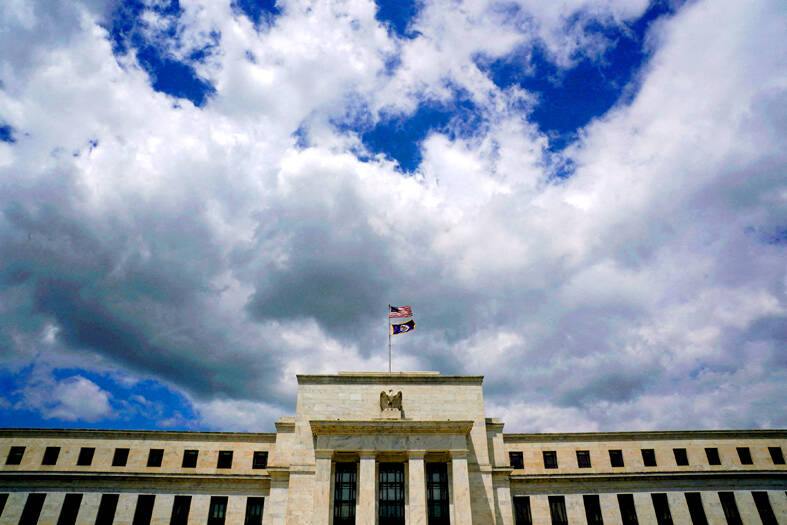Economists are starting to think the US Federal Reserve is keeping money a little too tight.
That is the takeaway from results of a National Association for Business Economics (NABE) poll published yesterday, which showed 21 percent of respondents considered the US central bank’s current monetary policy stance to be “too restrictive” — the most since 2011.
The results, published ahead of NABE’s annual economic policy conference this week in Washington, were collected between Jan. 23 and 30, just before the Fed’s most recent policy meeting on Jan. 30 and 31.

Photo: Reuters
Fed officials raised their benchmark interest rate by more than five percentage points between March 2022 and July last year, in the fastest tightening cycle since the early 1980s.
Inflation receded quickly in the second half of last year, priming expectations in financial markets that the central bank would start reducing rates early this year.
At last month’s policy-setting Federal Open Market Committee meeting, Fed Chair Jerome Powell and his colleagues voted to leave the benchmark unchanged and signal that the next gathering next month would be an unlikely starting point for rate cuts. Investors are currently betting that easing will begin in May.
Powell cited robust economic growth and a strong job market as reasons why the Fed could take its time before beginning to undo the tightening measures. A monthly employment report published on Feb. 2 showed job creation was much higher than expected to start the year, and job growth last year was also revised higher.
Meanwhile, credit risk indicators from Janus Henderson Investors have stopped flashing all red for the first time since central banks stepped up a fight against inflation, suggesting the Fed looks increasingly likely to achieve a coveted “soft landing.”
Access to capital markets as well as cash flow and earnings are now amber on the asset manager’s traffic light system, having been red since the third quarter of 2022. A debt load and servicing indicator remains red.
This easing of some risk signals comes as expectations of interest-rate cuts by major central banks this year have reduced the cost of company debt in recent months, making it easier to refinance old debt with new. That brings the policymaker goal of curbing inflation without triggering a major economic slump, known in the market as a soft landing, into sight.
“The Fed has already signaled a pivot in policy rates,” Janus Henderson global head of fixed income Jim Cielinski said in a statement yesterday. “We are slightly overweight credit and see further spread tightening as likely if the consensus ‘soft landing’ narrative holds.”
The cash flows indicator turned to amber after better-than-expected economic data in the US and “the bottoming” of purchasing managers’ index numbers in Europe, the firm said. Access to capital improved thanks to a slump in yields late last year and a continuing drop in corporate bond spreads in early this year.
By contrast, credit fundamentals worsened slightly, with default rates picking up in US and European junk-rated firms, keeping the debt load and servicing indicator in the red.

Semiconductor shares in China surged yesterday after Reuters reported the US had ordered chipmaking giant Taiwan Semiconductor Manufacturing Co (TSMC, 台積電) to halt shipments of advanced chips to Chinese customers, which investors believe could accelerate Beijing’s self-reliance efforts. TSMC yesterday started to suspend shipments of certain sophisticated chips to some Chinese clients after receiving a letter from the US Department of Commerce imposing export restrictions on those products, Reuters reported on Sunday, citing an unnamed source. The US imposed export restrictions on TSMC’s 7-nanometer or more advanced designs, Reuters reported. Investors figured that would encourage authorities to support China’s industry and bought shares

FLEXIBLE: Taiwan can develop its own ground station equipment, and has highly competitive manufacturers and suppliers with diversified production, the MOEA said The Ministry of Economic Affairs (MOEA) yesterday disputed reports that suppliers to US-based Space Exploration Technologies Corp (SpaceX) had been asked to move production out of Taiwan. Reuters had reported on Tuesday last week that Elon Musk-owned SpaceX had asked their manufacturers to produce outside of Taiwan given geopolitical risks and that at least one Taiwanese supplier had been pushed to relocate production to Vietnam. SpaceX’s requests place a renewed focus on the contentious relationship Musk has had with Taiwan, especially after he said last year that Taiwan is an “integral part” of China, sparking sharp criticism from Taiwanese authorities. The ministry said

US President Joe Biden’s administration is racing to complete CHIPS and Science Act agreements with companies such as Intel Corp and Samsung Electronics Co, aiming to shore up one of its signature initiatives before US president-elect Donald Trump enters the White House. The US Department of Commerce has allocated more than 90 percent of the US$39 billion in grants under the act, a landmark law enacted in 2022 designed to rebuild the domestic chip industry. However, the agency has only announced one binding agreement so far. The next two months would prove critical for more than 20 companies still in the process

CHANGING JAPAN: Nvidia-powered AI services over cellular networks ‘will result in an artificial intelligence grid that runs across Japan,’ Nvidia’s Jensen Huang said Softbank Group Corp would be the first to build a supercomputer with chips using Nvidia Corp’s new Blackwell design, a demonstration of the Japanese company’s ambitions to catch up on artificial intelligence (AI). The group’s telecom unit, Softbank Corp, plans to build Japan’s most powerful AI supercomputer to support local services, it said. That computer would be based on Nvidia’s DGX B200 product, which combines computer processors with so-called AI accelerator chips. A follow-up effort will feature Grace Blackwell, a more advanced version, the company said. The announcement indicates that Softbank Group, which until early 2019 owned 4.9 percent of Nvidia, has secured a